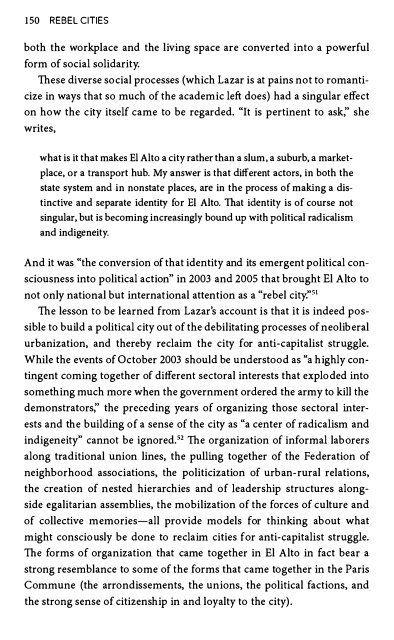Rebel Cities-David Harvey
Rebel Cities-David Harvey
Rebel Cities-David Harvey
- No tags were found...
You also want an ePaper? Increase the reach of your titles
YUMPU automatically turns print PDFs into web optimized ePapers that Google loves.
ISOREBEL CITIESboth the workplace and the living space are converted into a powerfulform of social solidarity.These diverse social processes (which Lazar is at pains not to romanticizein ways that so much of the academic left does) had a singular effecton how the city itself came to be regarded. "It is pertinent to ask;' shewrites,what is it that makes El Alto a city rather than a slum, a suburb, a marketplace,or a transport hub. My answer is that different actors, in both thestate system and in nonstate places, are in the process of making a distinctiveand separate identity fo r El Alto. That identity is of course notsingular, but is becoming increasingly bound up with political radicalismand indigeneity.And it was "the conversion of that identity and its emergent political consciousnessinto political action" in 2003 and 2005 that brought El Alto tonot only national but international attention as a "rebel city."51The lesson to be learned from Lazar's account is that it is indeed possibleto build a political city out of the debilitating processes of neolib eralurbanization, and thereby reclaim the city for anti-capitalist struggle.While the events of October 2003 should be understood as "a highly contingentcoming together of different sectoral interests that exploded intosomething much more when the government ordered the army to kill thedemonstrators;' the preceding years of organizing those sectoral interestsand the building of a sense of the city as "a center of radicalism andindigeneity" cannot be ignored. 52 The organization of informal laborersalong traditional union lines, the pulling together of the Federation ofneighborhood associations, the politicization of urban-rural relations,the creation of nested hierarchies and of leadership structures alongsideegalitarian assemblies, the mobilization of the forces of culture andof collective memories-all provide models for thinking about whatmight consciously be done to reclaim cities for anti-capitalist struggle.The forms of organization that came together in El Alto in fact bear astrong resemblance to some of the forms that came together in the ParisCommune (the arrondissements, the unions, the political factions, andthe strong sense of citizenship in and loyalty to the city).


